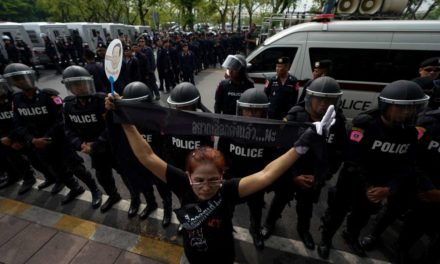(This composite article is based on talks by Focus Executive Director Walden Bello and interviews with him appearing in the Italian dailies Liberazione , Il Manifesto, and other newspapers during a recent anti-war speaking tour of Canada , Malaysia , India , Netherlands , and Italy in March and April of this year.)
What is the state of the global anti-war movement?
Well, it actually continues to have tremendous potential. True, the March 20 demonstrations marking the anniversary of the invasion of Iraq in 2004 and 2005 were smaller than the February 15, 2003 demonstrations. True, many people were discouraged that the Feb. 15 marches did not prevent the US from invading Iraq , but people are digging in for the long haul and moving in new directions in terms of tactics. It we look at this as a 10 round boxing match, we are just in round two.
What do you mean?
Take a look at the US . True, there were no big marches on March 20 this year, but there were anti-war activities in more than 700 cities. People are expanding their grassroots efforts to educate ordinary Americans about the war, and this is helping make a difference: withdrawal from Iraq , according to the polls, has now been consolidated as a position among a majority of the American public.
Take a look at Italy , where public disaffection with Italy ‘s participation in the war is at an all-time high owing to the killing at a checkpoint of the Italian government agent Nicola Calipari by US soldiers when he was escorting former hostage Giuliana Sgrena to the Baghdad airport. The anti-war movement there is showing the way for the rest of the world. It’s “bringing the war home,” to use a Vietnam era phrase. A citizens’ movement, among whose leaders is the Italian MP Mario Bugarelli , was able to successfully prevent Italian authorities from offering the airport at Rimini to Washington to serve as a logistical support base for the war in Iraq .
To mark April 25, the day of liberation from fascism, a couple of hundred people protested outside Camp Darby , near Pisa , demanding that the base be shut down. And I have just been to Sassari and Cagliari in Sardinia , the big island in the middle of the Mediterranean , where two big public meetings were held to urge the shutting down of the US nuclear base at Maddalena . Sardinia is critical since it contains 60 per cent of the “space” devoted to the US military in Italy . It’s like Okinawa in relation to Japan . An accident involving a US nuclear submarine a couple of years ago underlined how vulnerable Sardinia is. This helped trigger the formation of a larger people’s movement against the maintenance of US military bases on the island. And now, this movement is being strengthened by and is contributing to the larger anti-war movement in Italy . This is what I mean when I refer to the strategy to “bring home the war” that a large sector of the Italian progressive movement is putting into motion as the next stage of the anti-war struggle.
Italy is a case wherein one of the unintended consequences of the Iraq War has been to reveal to the people of how massive the US presence is in their own country, how compromised their own sovereignty is. I hope its example will help reinvigorate the anti-bases movement in those two East Asian countries with troops in Iraq , Japan and South Korea .
What are the priorities for the global anti-war movement?
To end the occupation of Iraq immediately, of course. But in order to do this, several things must be done. For the European peace movement, in particular, the priority is knocking Italy and Britain out of the war. The participation of these two governments, despite the opposition of the vast majority of their peoples, continues to provide what little legitimacy is left for the US occupation.
You talk about new ways of meeting the challenge of this long boxing match with the US . What are these?
Well, as I’ve said repeatedly over the last few months, first, we need to coordinate more effectively across borders. Second, we need to bring new tactics on stream, like shutting down the offices of Halliburton, the US contractor in Iraq , throughout the world, and engaging in massive civil disobedience. We’ve got to go beyond marches and demonstrations. Third, we’ve got to bring the war home, connect the war to local issues like US military bases, and I’ve already talked about that. Fourth, we’ve got to forge ties between the global peace movement and civil society movements in the Middle East and the Arab world, which means we have to reach out beyond the “terrorist” labels Washington uses to prevent peoples’ movements from working together. We’ve got to do this since the Middle East is the strategic battleground of the next few decades and we’re not going to win unless we cooperate with our fellow activists in that part of the world.
What’s the situation in Iraq at this point?
The US is not winning. It’s not convincing anybody that with the elections, there is a new game in Iraq , and that game is democracy. An election boycotted by millions of people—in fact, by the vast majority of Sunnis—and held under military occupation is hard to sell to the world as legitimate. Militarily, the US is overextended. It can only spare 135,000 ground troops when, just to fight the guerrillas to a stalemate, it would need 500,000 to a million troops, according to estimates by US military sources themselves. Pouring in significantly more troops will be impossible without provoking civil strife in the US, which is why the US is desperately pressing Britain and Italy and whoever is left in the “Coalition of the Willing” to keep their contingents in Iraq. With Hungary and the Netherlands withdrawing their troops, and with Poland indicating it also wants out, the Pentagon in fact refers less frequently to its allies as a “Coalition” and resorts more to the term “multinational forces.”
Who are likely to be the new targets of US intervention?
In fact, the US is less capable of carrying out military intervention today than in 2003. Being pinned down in Iraq means the US has no ground forces capable of launching new military adventures in Iran , North Korea , Syria , or Venezuela . Surgical airstrikes possibly, but ground troop intervention and occupation, no.
In your book Dilemmas of Domination* and elsewhere you talk about the crisis of “ US overextension.” What do you mean?
The Iraqi resistance has in fact made it very difficult for the US to intervene elsewhere, and it has greatly exacerbated the condition of overextension of the US globally. Never underestimate US imperialism, but never overestimate it either. Look, the US is losing the so-called War against Terror, the Sharon-Bush alliance is not winning in Palestine , the Atlantic Alliance is dead, the US-backed Karzai government controls only one or two cities in Afghanistan , and anti-US, anti – neoliberal forces have come to power either via the vote or via popular uprisings throughout Latin America . The global correlation of forces is shifting against the US , though this does not mean US power is unraveling any time soon. It’s going to be a long slog for our side. As I said earlier, it’s only round two of a ten round match. But it does mean the Empire is not almighty.
*Published by Henry Holt and Co, New York, 2005.








